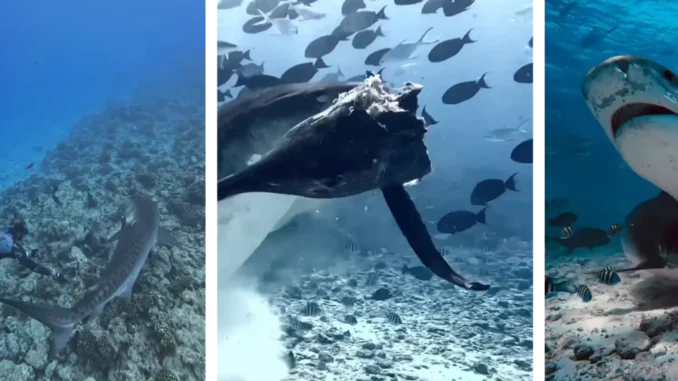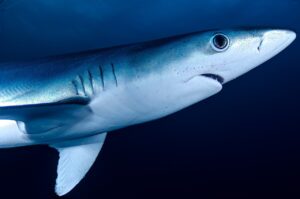
Fuvahmulah Island in the Maldives has been recognised as the location of the largest documented aggregation of tiger sharks globally, according to a recent study published on Nature.com.
Over six years, researchers led by Lennart Vossgaetter from the Leibniz Centre for Tropical Marine Research in Germany identified 239 individual tiger sharks through non-invasive photo identification methods. This represents the highest number of individual tiger sharks recorded in a single, geographically confined area.

The research revealed that tiger sharks around Fuvahmulah exhibit strong site fidelity, especially adult females, which remain in the area for extended periods during gestation. The waters surrounding the island provide critical habitat for these sharks, offering warm temperatures and a consistent food supply from discarded fish waste, making it ideal for reproduction.
Positive Outlook for Tiger Shark Conservation
The study highlighted Fuvahmulah as a vital site for tiger shark conservation in the Indian Ocean, housing the world’s largest known aggregation. The protected status of sharks in Maldivian waters contributes to the island being a “bright spot” for conservation efforts. Researchers emphasise that the island’s waters are essential for supporting female tiger sharks during gestation, serving as a crucial refuge that helps sustain their population.
However, the researchers also pointed out the necessity for further studies on the geographic connectivity of Fuvahmulah’s tiger sharks. Telemetry research could determine whether these sharks primarily inhabit the protected waters of the Maldives shark sanctuary or venture beyond its limits. Such insights are essential for understanding their movements and enhancing conservation strategies.
Balancing Tourism and Conservation
The study also raised concerns about the absence of formal regulations governing shark tourism in the Maldives, which has become a significant economic driver for local communities. The researchers noted that shark diving at sites like Fuvahmulah’s “Tiger Harbour” is currently unregulated, lacking official guidelines for shark provisioning for tourism purposes. Existing codes of conduct at diving sites are voluntary and vary by dive center.
Drawing inspiration from successful management strategies employed in other shark diving destinations, such as locally managed marine protected areas (MPAs) in Fiji, the researchers recommended establishing formal regulations to oversee shark provisioning and diving practices in Fuvahmulah. They argued that adopting sustainable practices is crucial to ensure the long-term conservation of tiger sharks and the economic benefits derived from shark tourism.
To prevent future conflicts between tourism and conservation, the study advocates for incorporating stakeholder interests into local management plans, promoting sustainable ecotourism practices in one of the world’s largest shark sanctuaries.
About Fuvahmulah Island
Fuvahmulah is the second southern-most atoll in the Maldives, situated 500 km from the capital, Male. The island, home to a population of 9000, is accessible via daily scheduled flights operated by the national carrier, Maldivian. Several dive centres are located near the harbour, accommodating the growing number of tourists who visit for tiger shark diving.

In addition to its fame as the “Tiger Shark Island”, Fuvahmulah is also known for its long, white sandy pebble beach, locally called “Thoondu”, on the northeast coast. The beach, with its natural beach breaks, is a popular destination for surfing.


